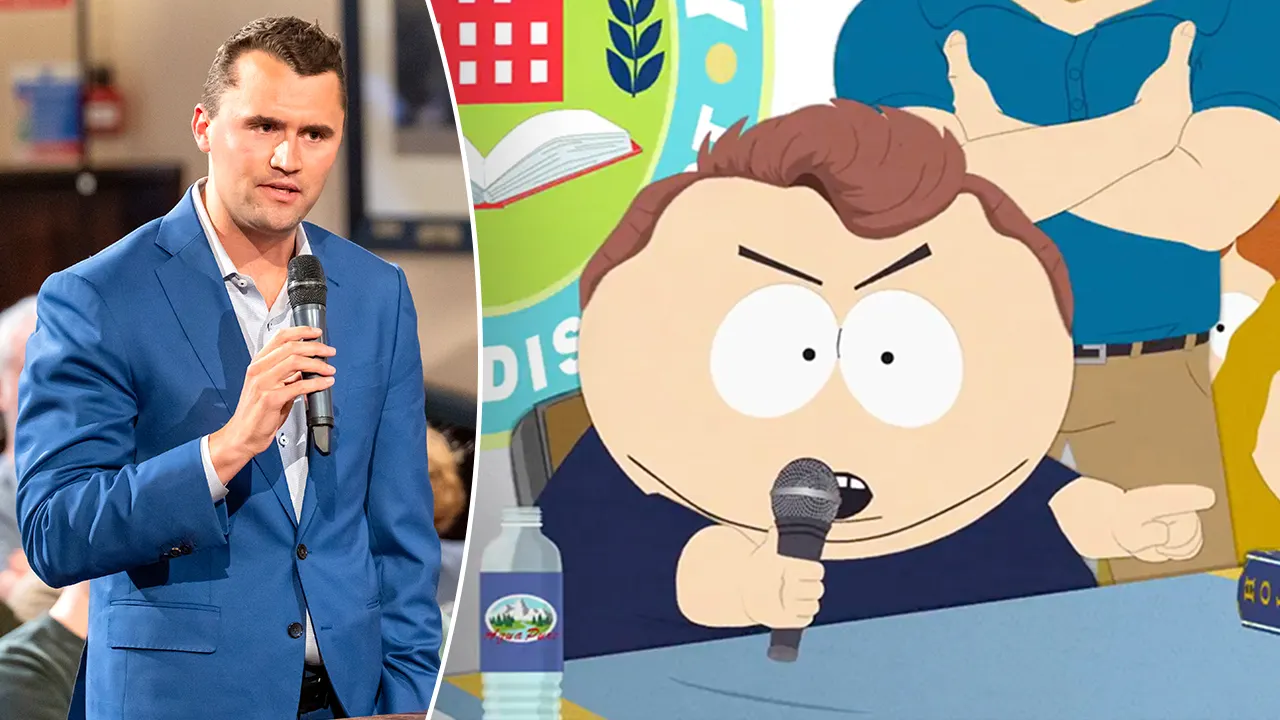South Park’s Cartman Became Charlie Kirk — And the Internet Can’t Stop Talking
A Satirical Twist That’s Dominating the Internet
This week, South Park delivered one of its sharpest satirical punches in years. In the episode “Got a Nut,” Eric Cartman takes on the persona of a brash, self-assured political debater, unmistakably modeled after Turning Point USA founder Charlie Kirk. Few expected this parody to become a viral talking point, yet its reach has exploded across social media and streaming platforms.
How the Parody Unfolds
The premise is simple but biting. Cartman discovers that Clyde Donovan has reinvented himself as an outrage-fueled podcaster, building a growing audience by trafficking in provocative takes and exaggerated grievances. Clyde’s online presence mirrors the kind of monetized anger seen in the real-world political podcast scene.
When Cartman realizes Clyde is essentially doing his act—only more profitably—he lashes out. The writers stage this meltdown as a “masterdebation” rant, in which Cartman berates copycats for selling out their purist bigotry. The term itself encapsulates the show’s knack for undercutting bluster with absurd humor, while making a pointed commentary on the mechanics of political outrage.
Satire as a Mirror
The parallels to Kirk’s own brand are deliberate. South Park leans into behaviors like selective outrage, confrontational debate with carefully chosen opponents, and editing clips to look like decisive victories. By exaggerating these methods through Cartman, the show holds up a mirror to an entire media ecosystem built on fueling division rather than fostering dialogue.
In one scene, Cartman openly admits that his targets often make valid points—only for him to cut those out in the editing room. This moment strips away the performance to reveal the underlying strategy: controlling the narrative at all costs.
The Reaction Beyond South Park
Kirk himself responded in a surprising way. Instead of distancing from the portrayal, he adopted the Cartman parody image as his social media avatar. Supporters saw it as proof he could take a joke; critics argued it showed he missed the critique entirely. This self-appropriation blurred the lines between satire and self-branding, making the episode’s commentary even sharper.
Meanwhile, reactions from political corners were mixed. Some far-right commentators tried to spin the portrayal as a badge of honor, while others expressed discomfort at how closely it mirrored reality. Even viewers with no interest in political media found the dynamic compelling, thanks to the show’s blend of crude humor and strategic insight.
The Business of Bigotry
At its core, “Got a Nut” critiques the transformation of political discourse into a content business. The episode underscores how outrage, fear, and identity politics can be packaged and sold to audiences looking for affirmation rather than complexity. In this economy of attention, viral clips matter more than nuanced discussion.
This isn’t new territory for South Park, but the timing gives it extra weight. The growth of podcasting, livestream debates, and paywalled “exclusive” content has created an environment where politics often feels like performance art. Viewers are not just informed—they’re entertained, provoked, and encouraged to keep consuming.
A Larger Cultural Moment
The episode also features secondary storylines that push the satire further. In one subplot, Mr. Mackey joins ICE under a fictionalized Kristi Noem, who is portrayed with grotesque exaggerations that spark both laughter and discomfort. JD Vance appears as a servile assistant to Donald Trump in scenes designed to lampoon political loyalty taken to absurd extremes.
These subplots broaden the scope, making it clear that South Park’s writers are not targeting one side of the spectrum but rather the media-driven culture of politics itself. Whether the figure in the crosshairs is left, right, or somewhere in between, the show treats the mechanisms of outrage as a shared flaw.
Why It Matters
Episodes like this succeed because they force audiences to think about the mechanics behind what they consume. Are political commentators sincerely trying to change minds, or are they running a business that depends on keeping audiences angry and engaged? By filtering this question through the ridiculous lens of Eric Cartman, South Park manages to make the critique more palatable without losing its bite.
Looking Ahead
South Park has a history of skewering sacred cows, and “Got a Nut” is another entry in that tradition. The virality of the episode suggests there’s still a large audience for satire that pushes both humor and discomfort. For Kirk and others in the real world, the challenge is deciding whether to treat such portrayals as harmless entertainment—or as signals that parts of their brand have become predictable enough to be parodied convincingly.
Final Thoughts
By merging a cartoon antihero with a real-life political figure, South Park has created a hybrid that’s both ridiculous and revealing. The Cartman-Kirk mashup is more than a gag; it’s a reflection of how politics and entertainment have blurred into one industry. Viewers are left to decide whether that’s an evolution worth celebrating—or a symptom of a conversation in decline.
https://twitter.com/TPostMillennial/status/1953280924298428784

Emily Johnson is a critically acclaimed essayist and novelist known for her thought-provoking works centered on feminism, women’s rights, and modern relationships. Born and raised in Portland, Oregon, Emily grew up with a deep love of books, often spending her afternoons at her local library. She went on to study literature and gender studies at UCLA, where she became deeply involved in activism and began publishing essays in campus journals. Her debut essay collection, Voices Unbound, struck a chord with readers nationwide for its fearless exploration of gender dynamics, identity, and the challenges faced by women in contemporary society. Emily later transitioned into fiction, writing novels that balance compelling storytelling with social commentary. Her protagonists are often strong, multidimensional women navigating love, ambition, and the struggles of everyday life, making her a favorite among readers who crave authentic, relatable narratives. Critics praise her ability to merge personal intimacy with universal themes. Off the page, Emily is an advocate for women in publishing, leading workshops that encourage young female writers to embrace their voices. She lives in Seattle with her partner and two rescue cats, where she continues to write, teach, and inspire a new generation of storytellers.









